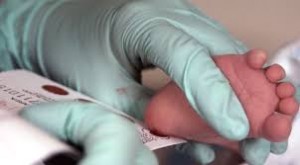Bonnie Rochman, writing for Time.com earlier this week, reports on a new bill before the Governor of North Dakota which would ban abortion based on sex selection or fetal abnormalities after six weeks:
The fetal abnormalities bill would ban abortion due to “any defect, disease or disorder that is inherited genetically.” It also extends to any physical disfigurement. In essence, it means that women in North Dakota who are told they may be carrying a baby with Down syndrome, spina bifida, or a fatal condition will have no choice but to have the baby; they would no longer be able to legally end their pregnancies. (As it stands, women in North Dakota don’t have a ton of options: as noted in a Time cover story by Kate Pickert, it’s one of four states with just one abortion clinic.) In addition to the medical reasons for aborting, expectant mothers may decide to end such pregnancies for a variety of reasons; in some cases, mothers may feel psychologically or emotionally unable to care for a child who may have special medical or developmental needs, while still others may feel economically incapable of supporting a child that may need such additional medical care.
Rochman’s article touches on the complex web of ethical issues at stake here: the bill bans abortions but doesn’t provide additional support for women who are fearful of raising children with special needs without financial, medical, and educational resources . . . The bill lumps together conditions such as anecephaly (in which a fetus’ brain doesn’t develop and which will lead to a very early death) and Down syndrome (in which the average life expectancy is 60) . . .
I was interviewed for this article because of my work on prenatal testing and our experience with Penny, who has Down syndrome, the most commonly identified chromosomal condition. In the article, Rochman draws upon our interview and quotes from my recent ebook about prenatal testing:
Amy Julia Becker learned that her daughter, Penny, has Down syndrome once she was born. While she’s sympathetic to the North Dakota legislation, she believes a better approach is endorsed by states such as Kentucky and Massachusetts, which require doctors to provide the latest, evidence-based information on not only the limitations of the condition but the “good lives that are possible for people with Down syndrome.”
“Pro-choice advocates should be concerned about the correlation between prenatal testing and abortion of babies with disabilities because data suggest that women often are not given the information they need in order to make an informed choice about their child, their family, and their future,” Becker wrote in her recent ebook about prenatal testing.
I’ve written plenty about these issues, and I will continue to write about them in the future. Although I share the concerns brought up by the North Dakota legislature about discrimination against people with disabilities starting in the womb, I also share the concerns Rochman brings up in her article about the government imposing decisions upon families who learn very hard news about their babies, and about forcing women to bear children they don’t feel equipped to support and raise. This bill points the finger solely at individual women rather than addressing the collective responsibility we bear to care for the most vulnerable among us–the babies, the pregnant mothers, and the ones with illnesses and intellectual and physical disabilities.
My hope lies not with outlawing selective abortion, as problematic as I find it, and as problematic as I find the attitudes of the medical establishment and the producers of the prenatal tests. Rather, my hope lies with providing the social supports to pregnant women and their partners/families, doctors, and then to individuals with disabilities throughout their lives.











